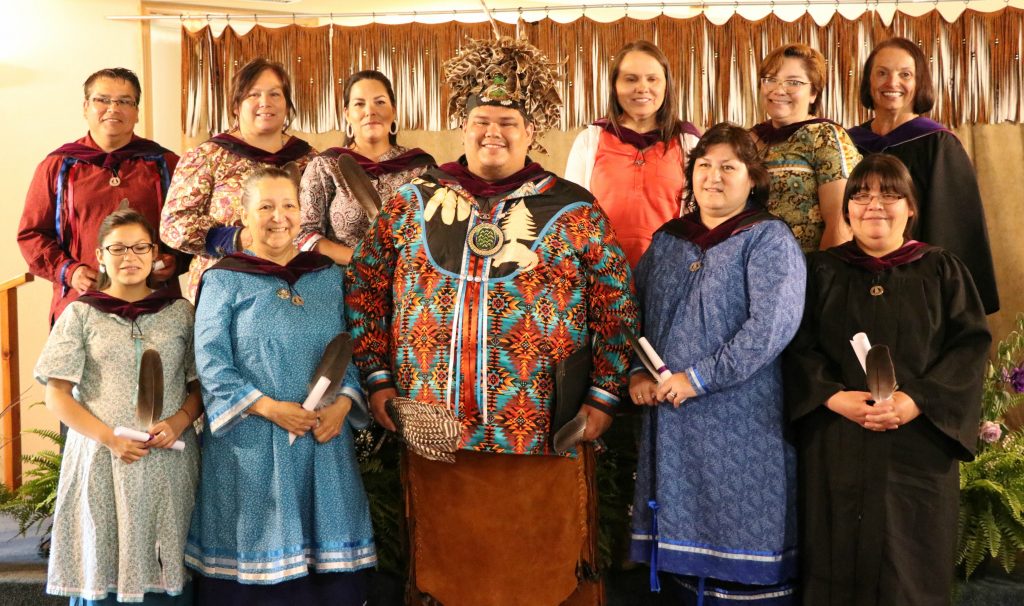Six Nations Polytechnic BA blazes a trail

Typically, setting up a bachelor’s degree program takes time. And even after a program is launched, it can take a few months for applications to roll in, and even longer before classes start.
But Six Nations Polytechnic isn’t your typical school.
In December 2015, the government of Ontario gave SNP approval to offer a bachelor’s degree in Ogwehoweh languages — Cayuga and Mohawk — a historic first for an Indigenous institute.
SNP hit the ground running, and the first cohort of the BA started less than a month later, most of them coming straight from a joint diploma offered by SNP and McMaster University’s Centre for Continuing Education.
“For most students, it was like a degree-completion program,” says Jennie Anderson, development officer at SNP.
A year later, 11 of those students in the first class made history at an emotional convocation ceremony, graduating with the first ever BA in Ogwehoweh Languages.
Many had to manage a full course load — three-hour classes five times a week, plus study time — in addition to their full-time jobs. Some were teachers, others community members wanting to better participate in ceremonies and governance conducted in Ogwehoweh languages. Some of them were parents who wanted to pass their own parents’ language down to their children. One, in her 80s, was a residential school survivor.
All were committed to helping revitalize their language.
“Language is so critically important,” Anderson says. “It’s deeply tied to Indigenous identity. In the longhouses, these languages are still used to conduct ceremonial business. Our governance, our identity, our understanding of the environment, kinship, and each other, it’s all tied into our language.”
Language revitalization was a key aspect of the Truth and Reconciliation Commission report, which called for the creation of post-secondary degrees in Indigenous languages.
Anderson is quick to point out that the survival of the two languages — even Cayuga, which is fluently spoken by only a few hundred people — doesn’t depend on the BA program. “But the program does bolster and accelerate community efforts,” she says, noting that community engagement is built right into the course work. “We want to ensure the degree isn’t just to the benefit of the student, but also to those around the student.”
As well, class projects could ultimately be used as resources for future students. “It creates a language economy, it gives us a chance to shape a curriculum, maybe publish more,” Anderson says. “Our work becomes part of the bigger language revitalization ecosystem.”
SNP communications officer Chelsey Johnson, who is studying Spanish, points out that she has a wealth of Spanish movies, music, TV shows and books to choose from if she wants to practise. “We don’t have that much in Mohawk or Cayuga. Not yet,” she says.
“So if we make stepping stones that build up future generations of students, maybe they can get ahead a little faster.”
SNP also created free downloadable language apps to help students learn Cayuga and Mohawk.
And because a BA is an academic credential program, it becomes easier for students to gain access to funding and support, instead of trying to study the languages “on the side.” Once they graduate, they can go on to careers in teaching or further studies.
“The BA opens doors to more opportunities, which is another aspect of language revitalization” Johnson says.
The BA in Ogwehoweh Languages started out offering third-year courses for people who already had a foundation in Mohawk or Cayuga, adding second-year classes in 2017. This fall, the first cohort of first-year BA students will start classes.
As well, the province passed legislation in December 2017, recognizing Indigenous institutes as the third pillar of post-secondary education (in addition to colleges and universities), which would open the door to further credential programs and partnerships with other institutions.
“Partnerships have always been a huge part of what SNP is and what we do,” Johnson says. “We’re built on partnerships here.”


